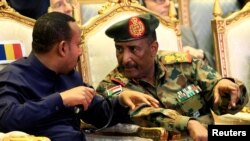Updated at 4:54 p.m. Aug. 21.
Sudan's top general was sworn in Wednesday as head of a military-civilian council that will run the country for slightly more than three years until elections are held. Concerns, however, have been raised about the makeup of the council.
The official SUNA news agency said Gen. Abdel-Fattah Burhan was sworn in as head of the 11-member Sovereign Council following negotiations between the military and civilian protesters. He is expected to lead the council for 21 months. After that, a civilian leader will head the body for 18 months.
A prime minister was also set to be sworn in.
Burhan led a military council that seized power in April after the military ousted President Omar al-Bashir, following mass protests against Bashir's 30-year rule.
Protesters like Mohamed Ali raised eyebrows after Burhan was named head of the council but decided to take a wait-and-see approach.
Ali said the appointment might affect the balance of power during the transition, but that as long as the constitutional declaration was binding and the law was dominant, there would be no manipulation.
Celebrations on the streets of Khartoum marked the end of a delay in the council's formation, but some locals remained concerned about the independence of the judiciary.
Protester Mazin Taj said he thought the Sovereign Council was a good step, but what worried him was the independence of the judicial system. He said it's better for people to focus on and push for the independence of the system now.
Analyst Khalid Al-Faki said he thought the formation of the council was the first step in building transitional institutions in Sudan.
Al-Faki said Sudan was officially under the transitional authority now after formation of the Sovereign Council and the naming of Nimat Koko as chief justice. He said he thought this step was crucial and assured a transformation toward building up the institutions of the civilian government.
As demonstrations flared in December over skyrocketing bread prices, protesters demanded political change.
Following Bashir's ouster in April, it was announced that a military council would rule for two years pending elections. Tensions rose as generals negotiated with protest leaders, but they came to a head as troops cleared a protest sit-in and killed dozens. Protesters had demanded a civilian-led government.
A final agreement on the structures of the transitional period was reached Saturday, under the auspices of mediators.











